
 The writings of Paul tend to get a bad rap in progressive Christian circles. He gets the blame for the subjugation of women, the rejection of queer people and the affirmation of slavery. He is seen as a conservatising force, taking the early church away from the radical message of Jesus and turning that message into something more palatable to conservative Roman culture and thus enabling its spread. Some of that critique is certainly appropriate to the second century writings, such as the pastoral epistles of Timothy and Titus ascribed to Paul by much later writers. However, parts of Paul’s writings reveal a radical thinker, capable of reframing the reforming Judaism of his upbringing into an entirely new faith – a faith moreover informed by his own experiences of persecution and imprisonment. Today’s passage invites Paul’s readers to a number of fresh perspectives on God, creation, and the purpose of life, that continue to challenge our own thinking today. Let’s look at some of it a little more closely...
0 Comments
Today’s Gospel reading is a very rich passage, full of extraordinary metaphors, story and meaning. It includes, for example, that powerful central affirmation of Christian Faith that God so loved the world that they sent their Beloved One that all who believe may have eternal life. Note well the heart of this good news: that God loves the world so much that all who believe – not just the doctrinally righteous, or the ethically conservative, but all may have eternal life. For the God we celebrate today is the God of unlimited, inexhaustible, love. As our Gospel text says, Christ comes among us not for condemnation, but for love and salvation. Let us therefore affirm again that you, we, all of us, are loved. The Gospel, our Good News, invites us to claim this, and live it. All of which brings us, in this passage, to the person of Nicodemus, and to light, and darkness… 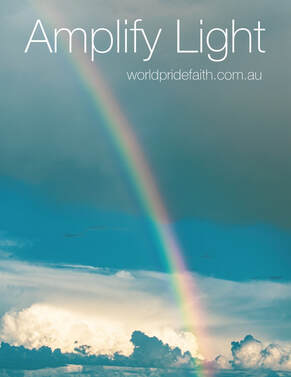 There was once a monk who, whenever he passed a mirror, would look into it, wink, and say: ‘so, you old rogue, who are you today, and what are you up to?’ It is a lovely example of what, at its best, today’s queer theology asks. It is at the heart of what Mark Jordan was saying in our contemporary reading today (‘In Search of Queer Theology Lost’). In a striking manner, it also helps lead us into this week’s great Gospel story of the Transfiguration and its meaning(s) for us. For the monk, queer theology, and our Gospel, each challenge us to deeper, more refreshing, ways of living and understanding life and faith. Each disturbs settled identities. Each offers us fresh insight into God: into divine Love and Be-ing, which can never be confined to any one identity, time or place. As one of my favourite memes has it, ‘God is always transitioning’ – or at least, our understanding of God. As, and when, we grasp that, we also share in transfiguring Love…  My wife Penny and I met at theological college. It was certainly not love at first sight. I was quite introverted, not trying to give away much of who I was, and Penny – well, Penny was very nervous and came across as a terrible caricature of an English middle-class blue stocking type of woman: think, those of you who can remember back that far, of Joyce Grenfell in the old St Trinian’s films. Our college was overwhelmingly full of men, with this being only the second year a handful of women had been admitted. So, when I met Penny in the first hour or so after arriving, I thought: ‘well, if this is how the women are here, I am simply not going to survive!’ I guess that was one factor in our initial relationship: sheer survival in an age and culture still trying to come to terms with the equality of women as a whole, never mind wider gender diversity. It was an earlier reminder that, if Penny and I were to minister, it would be as salt. We would be adding fresh flavour to both the Church and the wider world, seeking to provide healing or simply preservation for some of us, and, from time to time, perhaps irritating others into whose wounds we might be placed to aid healing. Maybe some will have views on how well, or otherwise, we have done that so far. Our hope and prayer is, in the words of Jesus in our Gospel reading today, that we, with others, will never lose out saltiness…  image by Sebastiano Iervolino on Pixaby image by Sebastiano Iervolino on Pixaby How do you, how do we, approach new things? On this New Year’s Day, how are we feeling about what is happening and may happen? My sense is that some of us are hopeful and excited, but others less sure and anxious. Some of us see fresh possibilities, and others renewed burdens. What does tomorrow’s world look like, and feel like, to you? How do you regard dragonflies? In the poem we heard earlier (As Kingfishers Catch Fire), the poet Gerard Manley Hopkins not only encourages us to be like them, but, in so doing, to be like Christ. Not everyone has always agreed however. In early colonial Australia for example, white fellas tried to kill dragonflies, just as they/we tried to kill so many other life-giving things that they/we did not understand. Those early colonialists saw dragonflies flying around and landing on their valuable horses, and they saw the horses moving and flicking their tails. So they thought the dragonflies were biting and making them crook. The colonialists were making things worse. The dragonflies were actually eating the mosquitoes and the gnats that were troubling the horses. They were life-givers, saviours even, not devils in disguise. In so many positive ways, dragonflies are thus evocative symbols for transgender people today. For, on this Transgender Day of Remembrance, we do well to attend to how bearers of light have been treated as embodiments of darkness. We do well, as our Gospel today (Luke 23.32-43) reminds us, to remember how Jesus was not crucified alone, and how others are also crucified today. And above all, we do well to affirm that it is only in recognising the light, in strange places, that we find salvation and hope for us all…
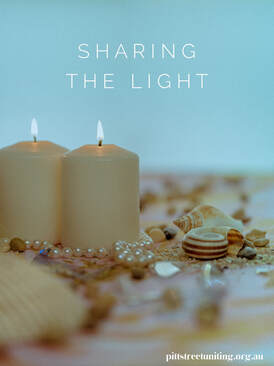 One of my grandchildren was particularly fascinated when I was in England in December. She was trying to grasp how it was night with me when it was daytime in Australia, and how it was so warm here and so cold where I was. One day, she had it sorted. Speaking to Penny on the phone, she loudly proclaimed ‘GranJo is upside down!’ I am not sure whether she thought that I was standing or walking on my head. However, in more than one sense, she was right - not least spiritually. After all, as Acts of the Apostles chapter 17 reminds us, like other early Christians, Paul and Silas were accused of ‘turning the world upside down’. It remains part of our Christian calling and sits well with the Presentation of Jesus in the Temple, otherwise known as the feast of Candlemas, which we mark today. Wherever, or whoever, we are in the world, we are all called to ‘live upside down’ in spiritual terms… 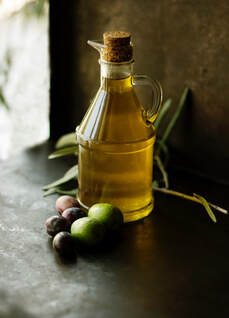 photo from Unsplash photo from Unsplash Today's baptism was delayed from the end of June by the lockdown this year. It is therefore long awaited. In another way however, it is especially appropriate to take place at this particular time: as we celebrate hope and the embodiment of love, especially with Mary and her extraordinary cry of liberation, typically known as the Magnificat. For the person we baptise is, in my view, a truly remarkable person, and a wonderful embodiment of love: both gentle and fearless, just like Mary, the mother of Jesus. Like each of us, she is a truly special creation of God. In her case, I am deeply humbled and enriched by the love and kindness of her presence, by the deep courage of their journey in life to join us; and by the possibilities and dreams she bears. For, like Mary, in her life and baptism today, she helps birth divine love anew among us. Like Mary, but in her own particular way, she thereby encourages us to magnify God’s love and help make it real among us… 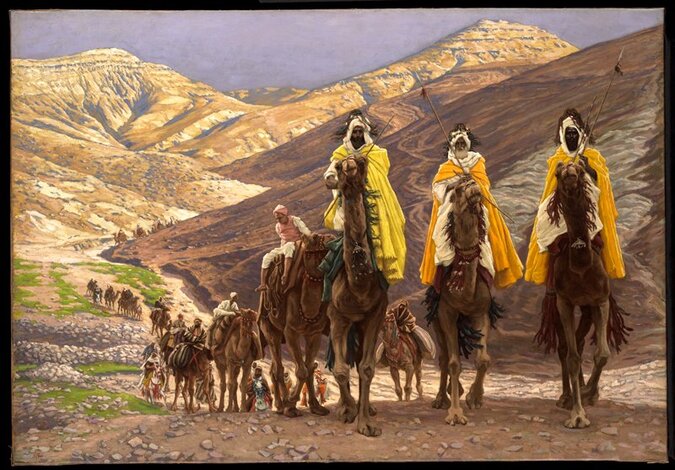 Journey of the Magi by James Tossit c.1894 Journey of the Magi by James Tossit c.1894 What jumps out at you in any Gospel story? Asking that question is part of the practice of Lectio Divina – divine reading of the scriptures. If you are not aware of that spiritual pathway, do speak with Penny afterwards! Approaching scripture that way, today it is the phrase ‘by another road’ which springs out for me from the text. Now I know that is partly because, in returning to Sydney very soon, I am taking ‘another road’ in my life and ministry this year. Indeed, this Gospel passage came to mind vividly when I came to accepting a fresh calling in the Uniting Church. What I have to say today is linked to that reflective unpacking. Yet isn’t ‘by another road’ a great phrase for most of us in our world at this time, as we emerge from 2020 where old roads (literally and metaphorically) were difficult if not impossible, and as we begin a new year? Let me suggest three ways in which this may be so, drawing on the story of the Magi. For there are at least three great questions which the Magi pose, and embody, for us all. How, that is, will we learn, love and light up our world, so that we too journey home ‘by another road’?... 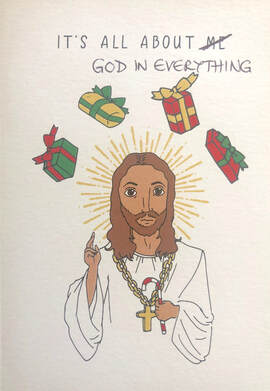 One of the Christmas cards that struck my eye this year was one that has a picture of a Jesus figure on the front, accompanied by presents around their head, and the proclamation ‘It’s All About Me’. What do you think about that? I suspect that it is a gentle way of poking fun at both the tendency of some Christians to be somewhat sanctimonious about ‘possession’ of our end of year communal festivities, and also the way in which we often want Christmas to meet our own expectations. This often begins as children - doesn’t it? – when we human beings don’t quite receive the magical Christmas for which we were hoping: maybe when we don’t have quite the special present we were expecting; and/or when our Christmas meal, or worship, isn’t quite right, or too much; or when we, or others around us, aren’t able to maintain the proverbial spirit of peace and goodwill in all our interactions. Sometimes our expectations are just too much, or too unrealistic. Sometimes they are quite right, and we are let down by events or by others. Either way, we may feel a little betrayed, especially if hopes for ourselves are involved. Perhaps however, in the disappointments of our personal Christmases, we may still learn a little of the wisdom in the birth of Christ. Fresh light may then stream in, particularly when we start looking beyond ourselves – not simply to the Christ child, but to everything about them. This may be part of the learning of this Covid-19 year, in which many Christmases are not as the world as a whole would hope. For, like the first Christmas, pictured in various ways in the Gospels, we have had to learn that it is not ‘All About Me’. If God is among us – the central message of Christmas – then he/she/they are everywhere, but not as we expected, and all of us are, truly, ‘in this together’… |
Authors
sermons and reflections from Penny Jones & Josephine Inkpin, a same gender married Anglican clergy couple serving with the Uniting Church in Sydney Archives
June 2024
Categories
All
|
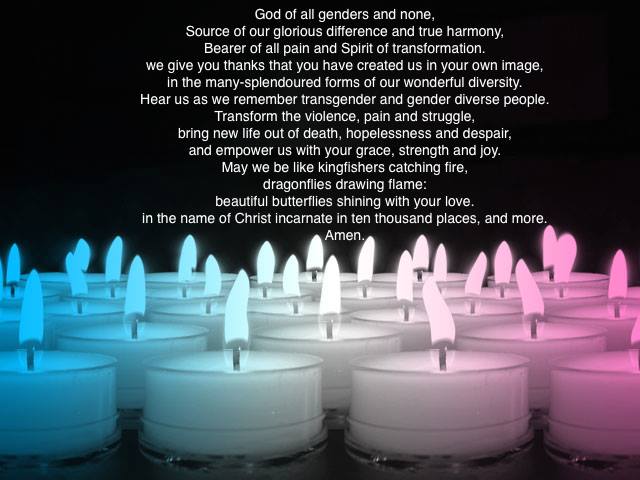
 RSS Feed
RSS Feed